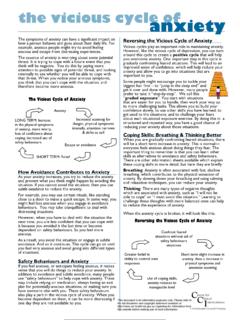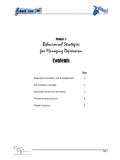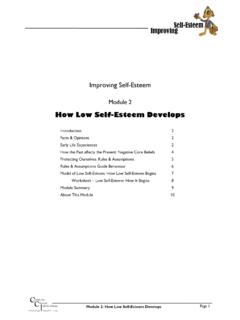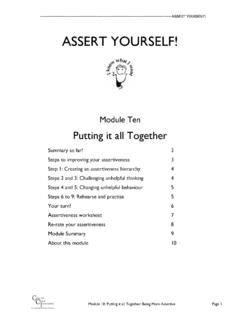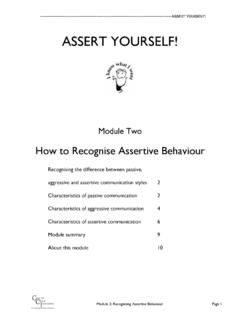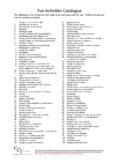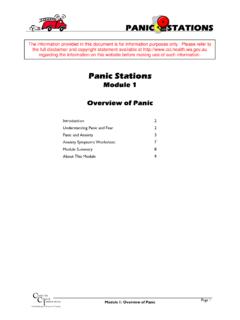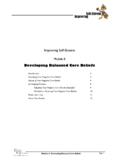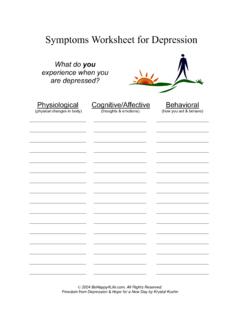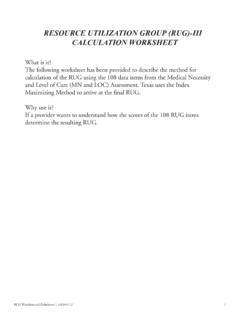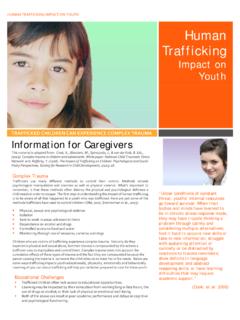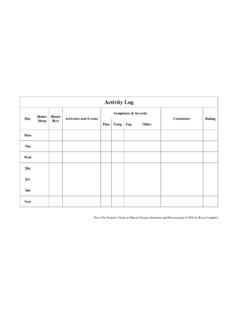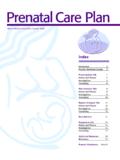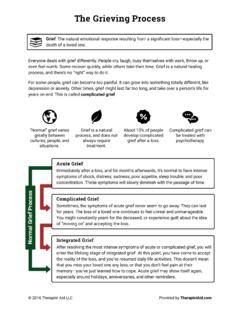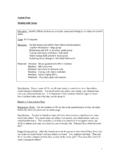Transcription of Module 1 Overview of Depression Contents - WA …
1 Centre forClinicalInterventions Psychotherapy Research TrainingPage 1 Back from the Module 1 Module 1 Overview of Depression Contents Page What Is Depression ? 2 Depressive symptoms worksheet 4 What Causes Depression ? 5 Psychotherapy for Depression 7 Module Summary 8 Centre forClinicalInterventions Psychotherapy Research TrainingPage 2 Back from the Module 1 What is Depression ? Many people experiencing the symptoms of Depression might begin to wonder if there is something really wrong with them. One typical fear is that they might be going crazy. Unfortunately, the reactions and comments from other people such as, Just get yourself together! are not very helpful. Although you might feel alone in your struggle against depressive moods, the reality is that many people experience these moods from time to time, or even regularly.
2 In fact, it is estimated that 1 in every 4 persons experience significantly depressed mood at some time in their life. Depression can affect any kind of person at any stage of their life. You may be an introvert or an extrovert, socially active or shy, youthful or elderly, male or female, wealthy or poor. Whatever your distinction, you can become depressed. That means that any person you know is fair game. So remember, you are not alone. Depression is a word used in everyday language to describe a number of feelings, including sadness, frustration, disappointment and sometimes lethargy. However, in clinical practice, the term " Depression " or "Major Depression " differs from these everyday 'down' periods in three main ways: Major Depression is more intense Major Depression lasts longer (two weeks or more) Major Depression significantly interferes with effective day-to-day functioning In this information package, the word Depression is referring to Major Depression or clinical Depression .
3 Depression as a Syndrome A syndrome is a collection of events, behaviours, or feelings that often, but not always, go together. The Depression syndrome is a collection of feelings and behaviours that have been found to characterise depressed people as a group. You may find that you experience all or some of these feelings and behaviours. There are many individual differences to the number of symptoms and the extent to which different symptoms are experienced. These symptoms are described in this next section. Mood Depression is considered to be a disorder of mood. Individuals who are depressed, describe low mood that has persisted for longer than two weeks. In mild forms of Depression , individuals may not feel bad all day but still describe a dismal outlook and a sense of gloom.
4 Their mood may lift with a positive experience, but fall again with even a minor disappointment. In severe Depression , a low mood could persist throughout the day, failing to lift even when pleasant things occur. The low mood may fluctuate during the day it may be worse in the morning and relatively better in the afternoon. This is called diurnal variation, which often accompanies a more severe type of Depression . Centre forClinicalInterventions Psychotherapy Research TrainingPage 3 Back from the Module 1 In addition to sadness, other moods common to Depression are: anxiety guilt worthlessness and inadequacy Thinking Individuals who are depressed think in certain ways. They tend to see themselves in a negative light. Often their self-esteem and self-confidence become very low.
5 They dwell on how bad they feel, how the world is terrible, and on how hopeless everything is. Physical Some people experience physical symptoms of Depression . Sleep patterns could change. Some people may experience difficulty falling asleep. Some may wake during the night and find it difficult to go back to sleep, or wake up early in the morning. Others may find themselves sleeping more and have difficulty staying awake Appetite may decline and weight loss occur, or some people may find themselves eating more than usual and thus gain weight Sexual interest may decline Energy levels may fall, as does motivation to carry out everyday activities. Depressed individuals may stop doing the things they used to enjoy because they feel unmotivated or lethargic Interacting with Other People Many depressed people express concern about their personal relationships.
6 They may become unhappy and dissatisfied with their family, and other close, relationships. They may feel shy and anxious when they are with other people, especially in a group. They may feel lonely and isolated, yet at the same time, are unwilling or unable to reach out to others, even when they have the opportunities for doing so. What about you? What symptoms of Depression do you experience? Turn to the next page for the Depression symptoms worksheet and write them down. To help you identify your symptoms of Depression , ask yourself: How does my life change when I m depressed? What have I noticed about what I do or don t do when I m depressed? How does my view of myself, others, and the future change when I m depressed?
7 What do other people notice about me when I m depressed? Centre forClinicalInterventions Psychotherapy Research TrainingPage 4 Back from the Module 1 SOMATIC/PHYSIOLOGICAL COGNITIVE/AFFECTIVE BEHAVIOURAL Depressive symptoms worksheet Depressive symptoms can be grouped into 3 possible categories. Some symptoms are of the physiological type, which are those that are have something to do with physical sensations or your physical body, for example: insomnia, poor appetite, or low energy levels. Some symptoms are of the cognitive (thoughts) and affective (emotions) type, such as: thoughts of suicide, hopelessness, feeling sad, and crying. The third category of symptoms is to do with how you act and behave, for example: staying in bed, not going out, avoiding people.
8 What do YOU experience, when you are depressed? Centre forClinicalInterventions Psychotherapy Research TrainingPage 5 Back from the Module 1 What causes Depression ? It is important to understand that Depression is not caused by one thing, but probably by a combination of factors interacting with one another. These factors can be grouped into two broad categories biology and psychology. Many biological and psychological factors interact in Depression , although precisely which specific factors interact may differ from person to person. Biological Factors The biological factors that might have some effect on Depression include: genes, hormones, and brain chemicals. Genetic Factors Depression often runs in families, which suggests that individuals may inherit genes that make them vulnerable to developing Depression .
9 However, one may inherit an increased vulnerability to the illness, but not necessarily the illness itself. Although many people may inherit the vulnerability, a great many of them may never suffer a depressive illness. Hormones Research has found that there are some hormonal changes that occur in Depression . The brain goes through some changes before and during a depressive episode, and certain parts of the brain are affected. This might result in an over- or under-production of some hormones, which may account for some of the symptoms of Depression . Medication treatment can be effective in treating these conditions. Brain Chemicals (Neurotransmitters) Nerve cells in the brain communicate to each other by specific chemical substances called neurotransmitters.
10 It is believed that during Depression , there is reduced activity of one or more of these neurotransmitter systems, and this disturbs certain areas of the brain that regulate functions such as sleep, appetite, sexual drive, and perhaps mood. The reduced level of neurotransmitters results in reduced communication between the nerve cells and accounts for the typical symptoms of Depression . Many antidepressant drugs increase the neurotransmitters in the brain. Psychological Factors Thinking Many thinking patterns are associated with Depression . These thinking patterns include: overstressing the negative taking the responsibility for bad events but not for good events having inflexible rules about how one should behave thinking that you know what others are thinking and that they are thinking badly of you Centre forClinicalInterventions Psychotherapy Research TrainingPage 6 Back from the Module 1 Loss Sometimes people experience events where loss occurs, and this can bring on Depression .

